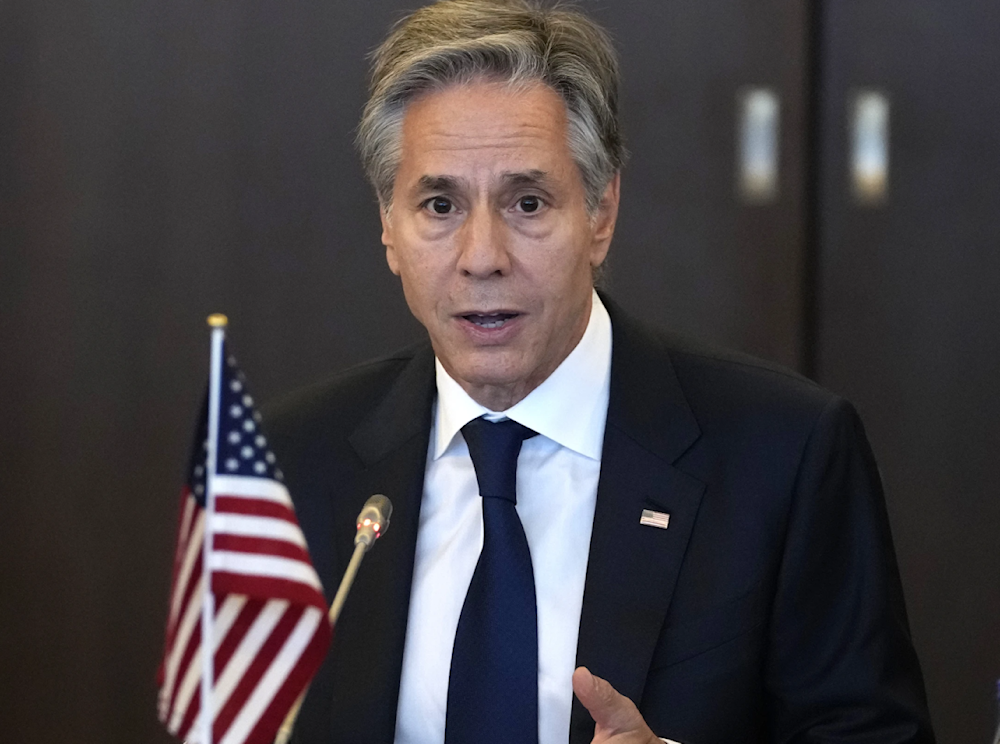Blinken says US not involved in Haniyeh's assassination
According to Iranian Mehr News, Haniyeh was targeted at around 2 am Tehran time while "stationed in one of the residences for war veterans in the north of Tehran."
-

US Secretary of State Antony Blinken speaks during the Quad Ministerial Meeting at the Foreign Ministry's Likura guesthouse in Tokyo on July 29, 2024, in Tokyo. (AP)
US Secretary of State Antony Blinken declared Wednesday that Washington was "not aware of or involved in" leader Ismail Haniyeh, head of the Political Bureau of Hamas' killing.
Hamas confirmed the martyrdom of the Hamas leader, noting that the head of the political bureau was killed in a "treacherous Zionist airstrike on his residence in Tehran."
Iran's IRGC later said, "We are studying the dimensions of the martyrdom of Ismail Haniyeh, head of Hamas' political bureau, and will announce the results of the investigation later."
"It's very hard to speculate, and I've learned over many years never to speculate on the impact one event may have on something else," Blinken added.
He was replying to queries from Singaporean broadcaster CNA on how Haniyeh's killing would affect Israel's war on Gaza. Blinken emphasized the urgency of a ceasefire in the strip as the war rages for 10 months.
According to Iranian Mehr News, Haniyeh was targeted at around 2 am Tehran time while "stationed in one of the residences for war veterans in the north of Tehran," detailing that he was martyred after "a projectile hit his place of residence."
An Iranian source revealed to Al Mayadeen that the assassination of Hamas' political bureau head Ismail Haniyeh in Tehran "was carried out by a missile launched from one country to another, not from within Iran."
Iranian Foreign Ministry spokesperson Nasser Kanaani confirmed that the relevant Iranian authorities are conducting "the necessary investigations to determine the dimensions and details of this incident."
He said, "There is no doubt that the pure blood of this resistance fighter, who dedicated his life to resistance and honorable struggle against the usurping Zionist entity, and in the pursuit of liberating holy al-Quds and the Palestinian people, will not be in vain."
"We feel the heavy burden and responsibility of the Palestinian cause, and this responsibility comes with costs. We are prepared for these costs: martyrdom for the sake of Palestine, for the sake of Allah Almighty, and the dignity of this nation."
— Al Mayadeen English (@MayadeenEnglish) July 31, 2024
Martyr Ismail #Haniyeh #Gaza… pic.twitter.com/OyZAwKLQr5
'Israel' to suffer severe punishment for Haniyeh's blood: Khamenei
The Israeli occupation "brought upon itself the most severe punishment," the Leader of the Islamic Revolution and Republic of Iran, Sayyed Ali Khamenei, affirmed, following the Israeli attack that targeted the Iranian capital of Tehran and the assassination of the head of Hamas' Political Bureau, Martyr Ismail Haniyeh.
Sayyed Khamenei stressed that retribution for Haniyeh's blood was "Iran's duty because he was martyred on our soil," adding that Haniyeh's assassination, who was a guest in Iran, "also set the ground for [the enemy's] harsh punishment upon itself."
Speaking about the martyred leader, Sayyed Khamenei said Haniyeh dedicated his life to the struggle [for liberation], was ready for martyrdom, and sacrificed his children on this path, noting that the "great Resistance Front is in mourning."
Consequently, Iran announced a three-day mourning period.
"Israel" may have sent the Middle East into a regional war following its attacks against Resistance leaders in both Lebanon and Iran, an article for the Financial Times warned.
The Israeli occupation bombed a residential building in Beirut's Southern Suburb, Lebanon, on Tuesday evening, not only killing three civilians, including two children, but also targeting senior Hezbollah military commander Fouad Shokor. "Israel" claims Shokor has been killed, but no official word from the Islamic Resistance has confirmed or denied his alleged martyrdom.
In the few hours that followed, the head of Hamas' political bureau, Ismail Haniyeh, was assassinated and martyred following an airstrike on his place of residence in Tehran, Iran. "Israel" has not claimed responsibility for the assassination.
According to the Financial Times, the attacks were Benjamin Netanyahu's warning to his enemies and an assurance his settlers could reflect on following months of political turmoil and calls for his resignation.
What Benjamin Netanyahu does not realize, is that this could have possibly been the matchstick that could ignite a regional war in the Middle East.

 4 Min Read
4 Min Read










